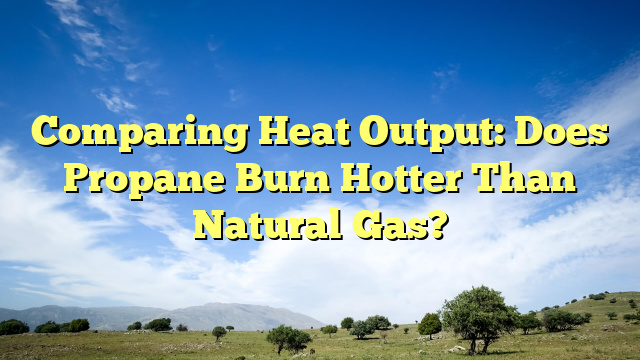Comparing Heat Output: Does Propane Burn Hotter Than Natural Gas?
Comparing Heat Output: Does Propane Burn Hotter Than Natural Gas?
When it comes to heating, cooking, or powering appliances, the choice between propane and natural gas is common. Both fuels are widely used across the globe due to their efficiency and relatively low environmental impact. However, one question often arises: does propane burn hotter than natural gas? This article delves into the heat output of both fuels, comparing their energy content, efficiency, and applications to provide a comprehensive understanding.
Understanding Heat Output
Before comparing propane and natural gas, it’s essential to understand how heat output is measured. The heat output of a fuel is typically measured in British Thermal Units (BTUs). One BTU is the amount of energy required to raise the temperature of one pound of water by one degree Fahrenheit. This measurement allows for a direct comparison between the heat outputs of different fuels.
Propane’s Heat Output
Propane is known for its high energy content. Specifically, one cubic foot of propane contains approximately 2,516 BTUs. This high energy content means that propane can produce a significant amount of heat per unit, making it an efficient fuel for heating and cooking.
Natural Gas’s Heat Output
In contrast, natural gas has a lower energy content per cubic foot. One cubic foot of natural gas contains about 1,030 BTUs. While this is lower than propane, natural gas is often more readily available and can be supplied through pipelines, making it a convenient choice for many consumers.
Comparative Analysis
When directly comparing the heat output of propane and natural gas, it’s clear that propane burns hotter. This difference in heat output has several implications for their use in heating, cooking, and other applications.
Efficiency and Cost
Due to its higher BTU content, propane is often considered more efficient than natural gas. It requires less fuel to produce the same amount of heat. However, this efficiency comes at a cost. Propane is typically more expensive than natural gas, primarily due to the costs associated with its transportation and storage.
Applications
The choice between propane and natural gas often depends on the specific application and the desired outcomes. For instance, propane’s higher heat output makes it ideal for outdoor cooking, as it can reach higher temperatures more quickly. On the other hand, natural gas’s lower heat output and cost make it a popular choice for home heating and cooking.
Environmental Considerations
Both propane and natural gas are considered cleaner alternatives to other fossil fuels like coal and oil. They produce fewer pollutants and greenhouse gases when burned. However, their environmental impact also depends on factors such as leakage and the efficiency of the appliances they power.
Propane’s Environmental Impact
Propane burns cleanly, producing minimal soot and pollutants. It is also not considered a greenhouse gas when released into the atmosphere. However, because it is transported and stored as a liquid, there is a risk of leaks which can contribute to environmental harm.
Natural Gas’s Environmental Impact
Natural gas also burns cleanly, producing less carbon dioxide than other fossil fuels. However, it is primarily composed of methane, a potent greenhouse gas. Leaks in the natural gas supply chain can contribute significantly to greenhouse gas emissions.
Conclusion
In conclusion, propane does burn hotter than natural gas, offering higher efficiency in terms of heat output per unit. This makes propane an excellent choice for applications requiring high temperatures, such as outdoor grilling. However, natural gas’s lower cost and convenience make it a popular choice for home heating and cooking. Both fuels have their advantages and disadvantages, and the choice between them often depends on specific needs, preferences, and environmental considerations.
| Aspect | Propane | Natural Gas |
|---|---|---|
| Energy Content (BTUs per cubic foot) | 2,516 | 1,030 |
| Cost | Higher | Lower |
| Efficiency | Higher | Lower |
| Environmental Impact | Lower risk of greenhouse gases, potential for leaks | Lower carbon dioxide, risk of methane leaks |
| Applications | Outdoor cooking, high-temperature needs | Home heating, cooking |
Ultimately, the decision between propane and natural gas should consider the specific requirements of the application, cost implications, and environmental impact. Both fuels offer benefits and drawbacks, making them suitable for different uses.

